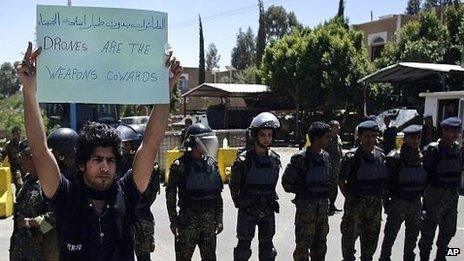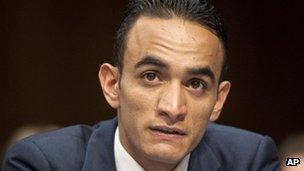US drones strain on Yemeni's dual loyalties
- Published

There is growing anger among Yemeni civilians over drone strikes
Farea al-Muslimi was born and raised in the poor Yemeni village of Wessab, the son of a farmer. He received his primary school education underneath a tree in a town that was bereft of electricity and paved roads.
Yet on 23 April, Mr Muslimi appeared in front of a US Senate Judiciary Committee, delivering passionate testimony denouncing a US drone strike that had hit Wessab only days before, killing five suspected members of al-Qaeda.
Farea al-Muslimi's path from Wessab to speaking at the US Senate was largely thanks to American aid; he won various scholarships first enabling him to learn English at a school in the Yemeni capital, Sanaa, and then to spend a year studying at a secondary school in California.
Mr Muslimi is now an activist and an increasingly prominent writer.

Farea al-Muslimi testified before Senators in Washington
He is also torn.
"It is as if your left hand has slapped your right cheek," says Mr Muslimi.
"I'm not just concerned about the reaction of my villagers, but also about my own safety from the drones my buddies are remotely piloting. It's a complex dilemma."
During George W Bush's presidency, American drone strikes largely targeted al-Qaeda operatives in Afghanistan and Pakistan, with only one strike in Yemen.
However, the number of drone attacks there has dramatically increased under President Barack Obama. In 2012 there were more drone strikes in Yemen than anywhere else.
Pro-drones
The increased is in response to the growing threat the US feels from al-Qaeda in the Arabian Peninsula (AQAP), widely believed to be the most powerful of the various al-Qaeda affiliated groups.
The drone strikes are also seen as a reaction to the absence of central government authority in many rural parts of Yemen, which came with the popular uprising that eventually led the country's longstanding ruler, Ali Abdullah Saleh, to step down in late 2011.
Mr Saleh largely refrained from publically supporting American drone strikes, for fear of angering Yemenis, some of whom are opposed to any American military presence in Yemen.
This even led to his government claiming public responsibility for some drone strikes, such as an attack in 2009 that resulted in civilian deaths.
"We'll continue saying the bombs are ours, not yours," Mr Saleh apparently told the former commander of US forces in the Middle East, Gen David Petreaus, according to a cable released by the Wikileaks website.
Mr Saleh's successor, President Abd-Rabbo Mansour Hadi, is much more openly pro-drones, even going as far as saying that he personally signs off all US drone strikes in Yemen himself.
Speaking to BBC Arabic, Yemen's Interior Minister, Abdul Qader Qahtan, defended his government's security ties with the United States.
"Yemen has suffered a lot from terrorism," he said. "The problem is that this organisation targets everyone, foreigners and Yemenis. This causes the Yemeni citizen to be afraid."
'Counterproductive'
The Senate hearing on drone attacks comes at a time of growing questions over whether the policy is in fact counter-productive in fighting al-Qaeda.
Although the targets of the drone strikes are figures linked to al-Qaeda, civilians have also been killed, leading to increased criticism of the tactic.
Joshua Foust, PBS's National Security Columnist, and a regular writer on the issue, believes that US policymakers choose drones because it is the best current option on the table when it comes to dealing with Yemen.
"They [the US] cannot solve the problem of the [secessionist] Southern Movement or the [insurgent] Houthis or even AQAP… but they can disrupt AQAP to where it can't organise another attack on the US," he said.
Mr Foust said drones must be seen as part of a wider strategy.
"Drones can be an effective tool if they're part of a larger strategy to counter and marginalise terror groups," he added. "But if drone strikes are the entirety of the strategy, or the only publicly visible part of that strategy, then they will not work."
On the other hand, Ghada Eldemellawy, of the British charity Reprieve, which works on the ground in Yemen campaigning against drone attacks, said the strikes are deadly and counterproductive.
"The harm goes far beyond those killed or physically maimed in attacks," she said. "The psychological impact of drones hovering constantly over villages devastates local populations."
She added that Reprieve's anti-drone campaign is gathering support.
"Families of those killed have been very receptive to our efforts and we hope to see President Hadi withdraw his original unconditional consent to the strikes - no government is allowed to permit the slaughter of its people."
Meanwhile, the people of Wessab are the latest in Yemen to experience a drone strike. They are fearful and angry, according to Farea al-Muslimi.
The drone strikes policy of the country he loves - the United States - has now arrived at the homes of his family, and it is leaving him in a precarious position.
"I don't even know if it safe for me to go back to Wessab, because I am someone who people in my village associate with America and its values."